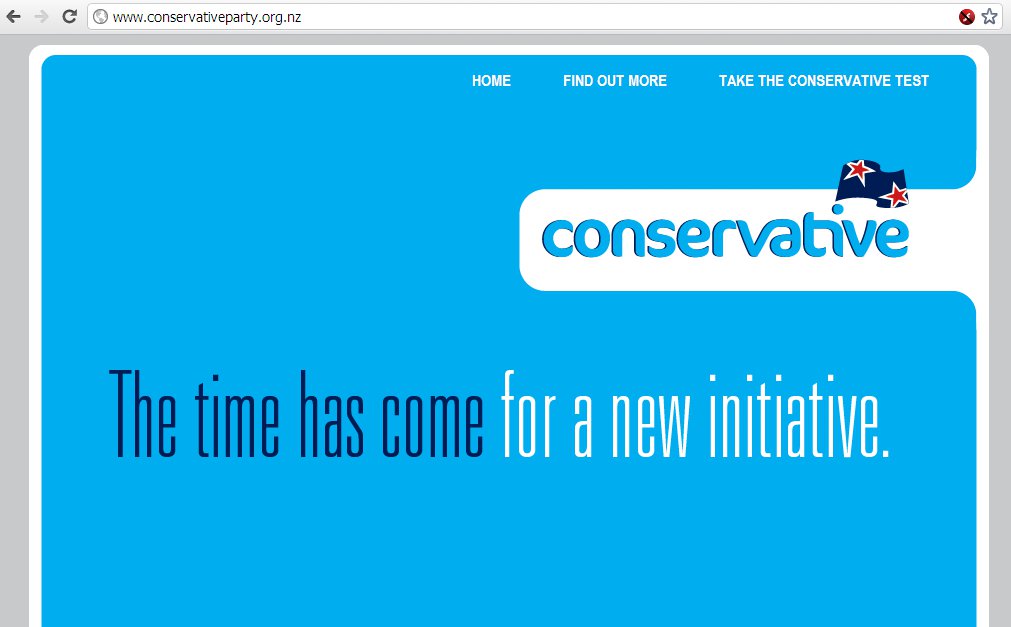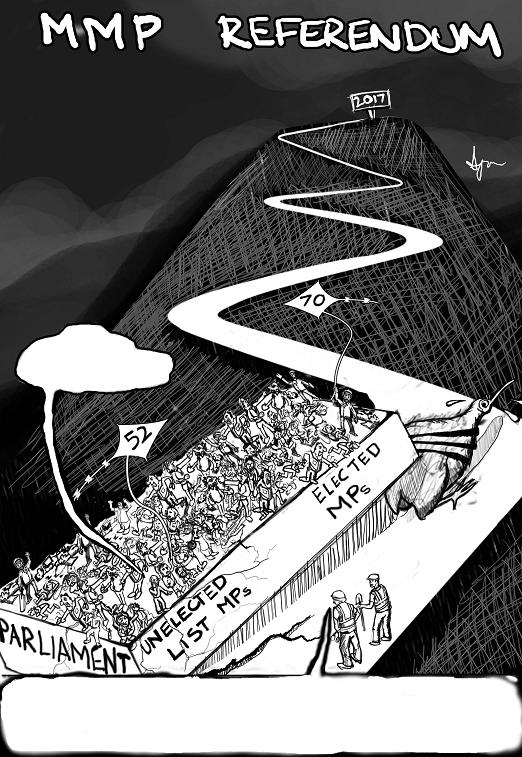I’m 8/19ths conservative, according to Colin Craig’s Conservative Test, on the website of the Conservative Party of New Zealand that was launched today. This might come as a surprise to some readers, which is fair enough. The questions asked in the quiz are quite poorly-written, complex, contradictory, question-begging, and the colour-coding on the answers marks it out pretty clearly as a polemic exercise; but I simply answered them at face value. There was a brief but pretty worthwhile discussion on twitter about the meanings embedded in the questions, but I decided to just answer them naively: to pick a side based on gut response.
That said, I think I probably am more conservative than many of my liberal brethren. Although I disagree very strongly with old-fashioned (‘paleo’) conservatives on many, if not most, policy and philosophical topics, I generally find them easier to understand than either libertarians or neoconservatives, for one major reason: they still believe in society, and especially in its central role in civic and political life. I can have a reasoned debate with someone who accepts that there is such a thing as society — and that it has a meaningful role to play in government, and vice-versa. It’s much harder to do so with those who (like Thatcher) simply deny its existence, or those who (like Norquist) having grudgingly admitted that society is not simply a figment of the collective socialist imagination, would prefer to drown it in the bathtub.
Several years ago, Anita addressed the place of the Christian right in a progressive society, and her words are similarly applicable to conservatism in general:
Perhaps the role of the Christian Right is a necessary one; it does not prevent change but it slows it and makes sure there’s enough discussion that the more conservative members of our society don’t get left behind and alienated from a society that moves too quickly and doesn’t take the time to persuade them and bring them along.
While I campaign for more liberal and progressive progress, I’m not sure I would be willing to pay the price of a divided antagonistic society. Perhaps I should thank the Christian Right for slowing us down enough that we can move together as a community.
Anita’s argument is very dear to me. I want the sort of society I want, of course, but I don’t want a society where whoever holds 51% of the power at present can enact swift, revolutionary changes that alienate the other 49% — or at least that they cannot do so with impunity. This is at root a very conservative view, although not in the polemic sense of that word. So, although I disagree of most of what it stands for, inasmuch as New Zealand conservatives are presently served pretty poorly, I think a conservative party could be a useful addition to the political canon.
I expect Colin Craig’s endeavour will fail, however. His quiz, as noted, does not suggest that very deep philosophical or political consideration has been given to the issues at hand. His previous forays into politics have been reactionary and underwhelming, and so expensive as to be unsustainable even in the medium term. It’s way too close to the election to make a meaningful impact. Also suggesting a slapdash approach, the iconography and branding of the Conservative Party (based on its website) is terrible:
The blue they’ve chosen is a middling sort of shade, neither ACT’s teal or National’s royal blue, similar to the shade I criticised previously when used in anti-MMP ads by Peter Shirtcliffe. There’s no good reason not to have chosen a deep flag-coloured navy blue here. The typefaces, far from being the solid, dependable sort we expect, are incongruous — one is cartoonish, the other is frightfully modern. If there was ever a decent time to deploy a newspaper font, this was surely it. In this regard, however, the effort isn’t quite as bad as Reform NZ, whose designers, in their wisdom, chose a font very similar to that used by LOLcat images.  Even his New Zealand flag is cartoonish — the opposite of the dignified, patriotic image they should be pitching for. They could have done a lot worse than emulating the masthead of Trevor Loudon’s old blog, which was one of the most striking in NZ — though now replaced by a dull white banner (the image at right salvaged from google image thumbnails).
Even his New Zealand flag is cartoonish — the opposite of the dignified, patriotic image they should be pitching for. They could have done a lot worse than emulating the masthead of Trevor Loudon’s old blog, which was one of the most striking in NZ — though now replaced by a dull white banner (the image at right salvaged from google image thumbnails).
There is also the perverse ideological incentive noted by Cactus Kate, that he seeks to disrupt ACT’s success in Epsom and thereby puts at risk the re-election of the Key government; if this happens, Labour’s proposed capital gains tax will likely be enacted, which would substantially disadvantage both himself personally (as a property investor) and many of his voters.
But in the final analysis, the biggest obstacle to the Conservative Party’s success is conservatism itself. By definition, conservative voters are reluctant to switch their support from one political vehicle to another. They require very good reasons to switch, and there is nothing to indicate that the Conservative Party will provide them.
L



